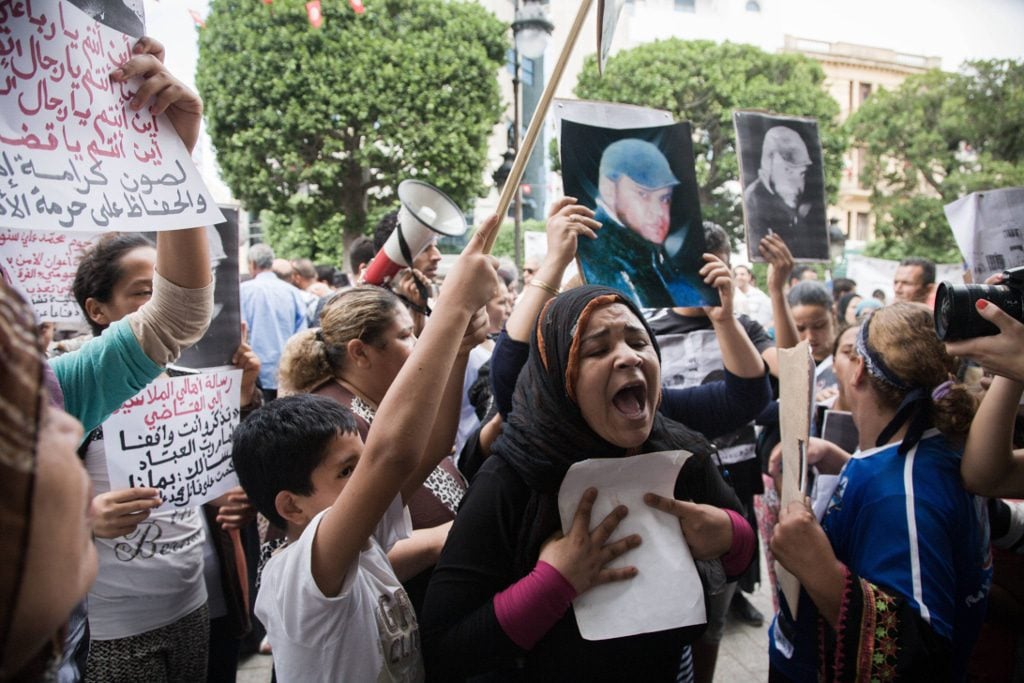
Tunisia has fared badly on human rights issues since it gained independence in 1956, when a dictatorial government quickly replaced the old colonial power and prioritized state-building over emancipation. After dictator Zine al-Abidine Ben Ali removed the founding president Habib Bourguiba in 1987, he transformed the country into a closed police state where human rights activists, especially Islamists, were barely able to leave their houses. Until Ben Ali himself was toppled by the Arab Spring in 2011, Tunisia’s human rights ranking was consistently among the lowest in the world.
The country’s human rights situation entered a new and radically different phase on 14 January 2011, when Ben Ali fled to Saudi Arabia. All political prisoners were released and charges against them and thousands of activists were dropped in a matter of weeks. The new Tunisian authorities called in former opponents and veteran human rights activists, who became ministers and ambassadors. Not surprisingly, the first elected president after Ben Ali, Mohamed Moncef Marzouki, was a longtime exile and staunch human rights activist.
Tunisia is now the Arab world’s only democracy. It is home to the Arab Institute for Human Rights, and a refuge for many Arab – mainly Egyptian – human rights organizations that are unable to operate in their home countries. Yet it is still a work in progress, and respect for human rights has numerous flaws.
Tunisian prisons are overcrowded, and there are reports of poor conditions, bullying, psychological abuse and rape. Police beatings of prisoners still occur and allegations have emerged of ongoing torture, although not systematic and politically motivated torture. Arrests are not always carried out in conformity with the law, and the judiciary can itself be biased or corrupt, leading to unfair and lengthy trials.
Some Tunisian laws are notoriously repressive. Under Law 52, smoking weed can send a smoker to jail for up to two years, and more than 8,000 (mostly young) people have been detained under the law. Adultery carries a prison term of up to five years and homosexuality is prohibited. Homosexuals caught having sex are systematically locked up, as in the case of a lawyer turned politician and his companion, who were arrested in a hotel room in the capital Tunis in 2013. At least seven men have been prosecuted in similar cases since September 2015.
Tunisia’s anti-terrorism law, promulgated in 2015 as a reshuffle of the 2003 text, has been widely criticized by local and international human rights organizations for the broad mandate it gives security forces and the judiciary in dealing with suspects, as well as its support of the death penalty. The text was rushed through parliament following the March 2015 attack on the Bardo Museum and the massacre at a Sousse beach resort three months later. Yet it was hard to question its irregularities, because of the ‘urgency and primacy’ of fighting terrorism.
In fact, since Tunisia has become the target of Islamic terrorism, the notion of ‘security before human rights’ has regained prominence; a déjà-vu of the Ben Ali era. The more frequent the attacks, the more entrenched that logic becomes. Ben Ali’s former officials and even the torturers in his notorious prisons have staged a comeback on the back of increasing terrorism. Moreover, some human rights activists, worried about the possibility of an Islamist take-over, are now advocating fewer liberties and harsher penalties in the war on terror.
An oft-heard argument in the Tunisian media is that terrorists do not deserve human rights. Some lawyers and intellectuals have called publicly for their execution and even their torture. Those who dare criticize this discourse risk being vilified in the press, another throwback to the Ben Ali era.
After the bloody attack by Islamic extremists in the southern town of Ben Guerdane in March 2016, a young soldier took a smiling selfie next to a dead terrorist. Those who criticized his actions were in a minority, and the Minister of Education himself congratulated the soldier and praised the selfie. This undermines Tunisia’s hard-won human rights, and threatens the future of democracy in the country.
Yet as bleak as the picture may seem, Tunisia is faring better than the rest of the Arab world. Police brutality is being countered with public campaigns, and the Interior Ministry frequently makes reparation. Hence, when a 27-year-old woman was raped by two police officers in 2012, she pressed charges and the two officers were sentenced to 15 years in prison. Similarly, when security forces mistakenly stormed a house in 2015, terrifying the residents, the victims went public with their story and the Interior Ministry was forced to issue an apology.
Tunisia has come a long way since Ben Ali’s repressive rule, but it still has a long way to go to become a country where human rights are fully respected.


